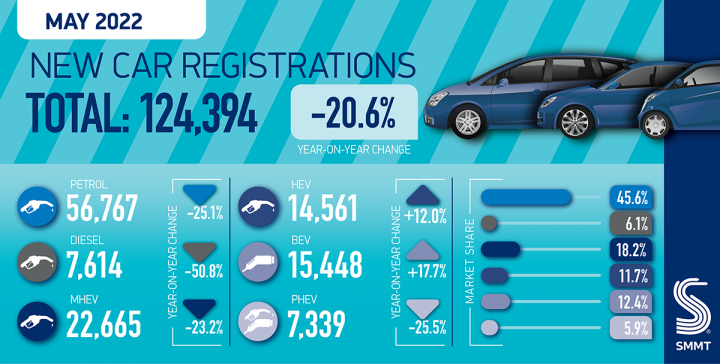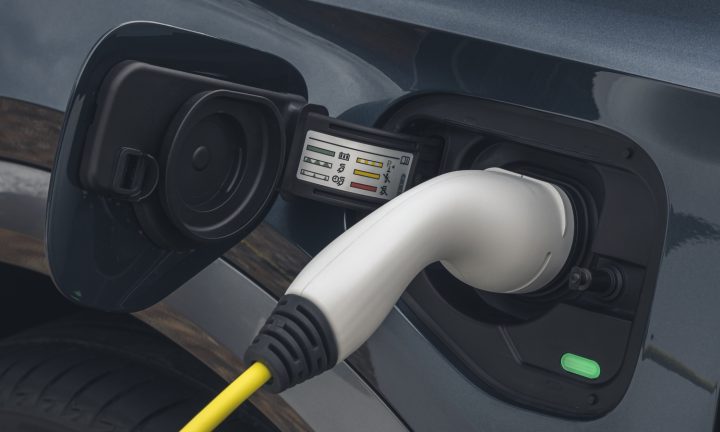New UK car registrations fell -20.6% to 124,394 units in the second weakest May since 1992, after the 2020 pandemic-hit market, as supply shortages continued to hamper new purchases and the fulfilment of existing orders, according to the latest figures from the Society of Motor Manufacturers and Traders.
Registrations amounted to 124,394 last month after a boom 12 months earlier when buyers were shrugging off the lockdowns but were able to buy cars which had been made but not sold in that period.
|
The decline, compared with the first full month of reopened showrooms in May last year, demonstrates the impact of continued global supply chain disruptions, with the market -32.3% below the 2019 pre-pandemic level despite strong order books. Private consumer purchases fell -10.3%, with Fleet collapsing 29.9% and business buyers 27.1% decline. May saw registrations of battery electric vehicles (BEVs) rise by 17.7%, representing one in eight new cars joining the road last month. Plug-in hybrids declined -25.5%, while hybrids were up 12.0%, meaning deliveries of electrified vehicles accounted for three in 10 new cars. Ford holds a narrow lead with total sales over Volkswagen and Audi. |
UK Top Ten May Corsa Puma Kuga Golf MINI Qashqai Sportage Niro Polo Tucson |
Drivers in Wales took delivery of 4,591 new cars last month, a drop of 12.49% on previous May.
Describing it as another challenging month for the industry, SMMT CEO Mike Hawes said, “To continue this momentum and drive a robust mass market for these vehicles, we need to ensure every buyer has the confidence to go electric.
“This requires an acceleration in the rollout of accessible charging infrastructure to match the increasing number of plug-in vehicles, as well as incentives for the purchase of new, cleaner and greener cars.
“Delivering on Net Zero means renewing the vehicles on our roads at pace but, with rising inflation and a squeeze on household incomes, this will be increasingly difficult unless businesses and private buyers have the confidence and encouragement to do so.”

Escalating fuel prices are hitting purchasing decisions as well.
RAC fuel spokesperson Simon Williams said, “The relentless run of record fuel prices continued over the bank holiday with the average price of petrol rocketing nearly 4p a litre since the end of May.
“A litre of unleaded is now a frightening 177.88p while diesel is 185p, an increase of 2p already this month. This means a tank of petrol now costs nearly £98 (£97.83) and diesel nearly £102 (£101.81).
“With oil above $120 a barrel and sterling still at $1.2, worse is still to come. Sadly, we expect to see the average price of petrol break through the 180p mark this week with diesel moving further towards 190p.
“More radical government intervention is urgently needed, whether that’s in the form of a further reduction in fuel duty or a VAT cut. As it is, drivers surely won’t be able to cope unless something is done to help. This is fast becoming a national crisis for the country’s 32m car drivers as well as countless businesses.”
Things are going from bad to worse for new car sales as the ongoing shortage of supply runs into a new problem – weakening buyer demand., said James Fairclough, CEO of AA Cars.
“With the exception of Electric Vehicles, new car sales have been weak for much of 2022. At the start of the year this could be attributed largely to a chronic shortage of new vehicles arriving in showrooms.
“But as the cost of living crisis begins to bite, with consumers simultaneously grappling with surging fuel, energy and food prices, some are opting to postpone big ticket purchases like a new car.
“The supply problems show little sign of abating, as lockdowns in China and the war in Ukraine exacerbate the shortage of key materials like steel and semiconductors, and hold back levels of car production.
“Against that backdrop, the apparent softening of buyer demand now threatens to create a perfect storm for new car sales.”


